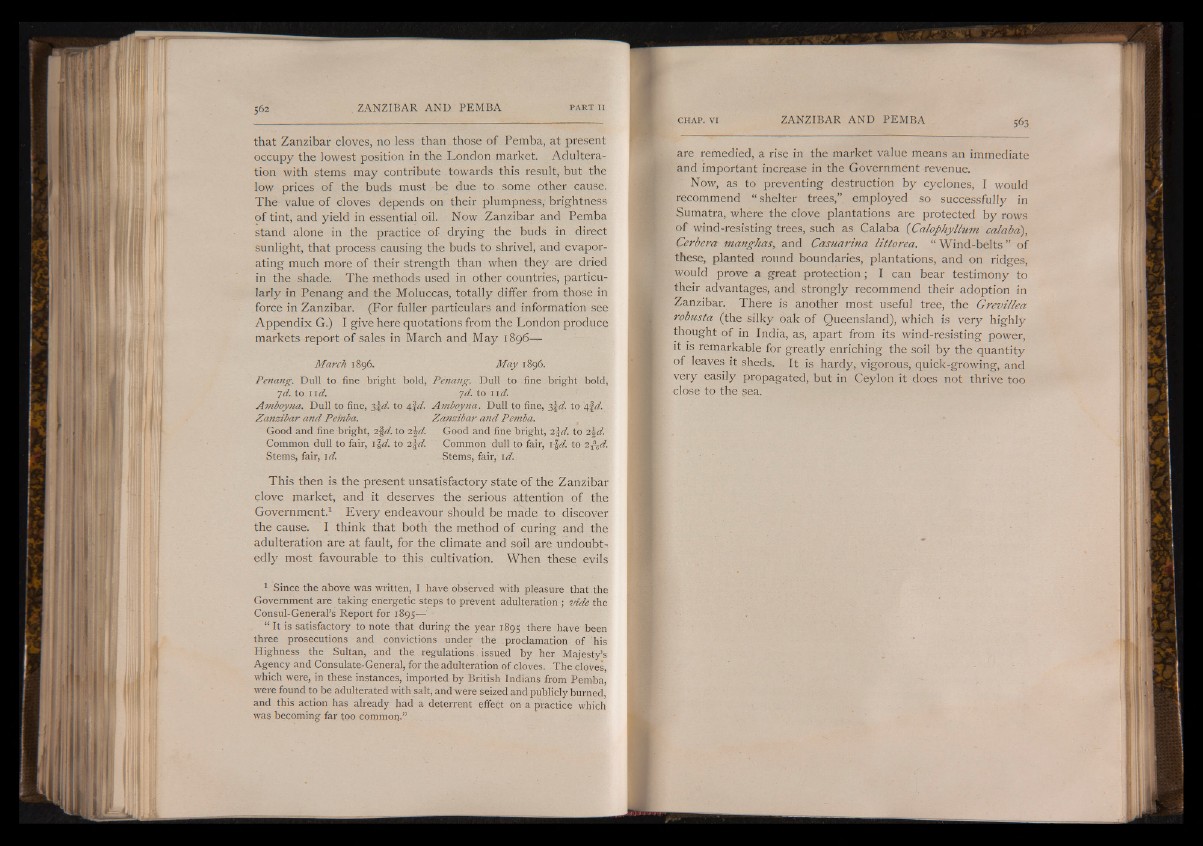
that Zanzibar cloves, no less than those of Pemba, at present
occupy the lowest position in the London market. Adulteration
with stems may contribute towards this result, but the
low prices of the buds must be due to some other cause.
The value of cloves depends on their plumpness, brightness
of tint, and yield in essential oil. Now Zanzibar and Pemba
stand alone in the practice of drying the buds in direct
sunlight, that process causing the buds to shrivel, and evaporating
much more of their strength than when they are dried
in the shade. The methods used in other countries, particularly
in Penang and the Moluccas, totally differ from those in
force in Zanzibar. (For fuller particulars and information see
Appendix G.) I give here quotations from the London produce
markets report of sales in March and May 1896—
March 1896. May 1896.
Penang. Dull to fine bright bold, Penang. Dull to fine bright bold,
jd . to 11 d. id . to 11 d.
Amboyna. Dull to fine, 3\d. to jam Amboyna. Dull to fine, 3\d. to 4f d.
Zanzibar and Pemba. Zanzibar and Pemba.
Good and fine bright, 2§d. to 2\d. Good and fine bright, i\d. to 2\d.
Common dull to fair, I\d. to 2\d. Common dull to fair, \\d. to 2
Stems, fair, \d. Stems, fair, id.
This then is the present unsatisfactory state of the Zanzibar
clove market, and it deserves the serious attention of the
Government.1 Every endeavour should be made to discover
the cause. I think that both the method of curing and the
adulteration are at fault, for the climate and soil are undoubtedly
most favourable to this cultivation. When these evils
1 Since the above was written, I have observed with pleasure that the
Government are taking energetic steps to prevent adulteration ; vide the
Consul-General’s Report for 1895^-^-'*
“ It is satisfactory to note that during the year 1895 there have been
three prosecutions and convictions under the proclamation of his
Highness the Sultan, and the regulations. issued by her Majesty’s
Agency and Consulate-General, for the adulteration of cloves. The cloves
which were, in these instances, imported by British Indians from Pemba,
were found to be adulterated with salt, andwere seized and publicly burned,
and this action has already had a deterrent effect on a practice which
was becoming far too common.”
are remedied, a rise in the market value means an immediate
and important increase in the Government revenue.
Now, as to preventing destruction by cyclones, I would
recommend “ shelter trees,”, employed so successfully in
Sumatra, where the clove plantations are protected by rows
of wind-resisting trees, such as Calaba (Calophyllum calaba),
Cerbera manghas, and Casuarina littorea. “ Wind-belts ” of
these, planted round boundaries, plantations, and on ridges,
would prove a great protection; I can bear testimony to
their advantages, and strongly recommend their adoption in
Zanzibar. There is another most useful tree, the Grevillea
robusta (the silky oak of Queensland), which is very highly
thought of in India, as, apart from its wind-resisting power,
it is remarkable for greatly enriching the soil by the quantity
of leaves it sheds. It is hardy, vigorous, quick-growing, and
very easily propagated, but in Ceylon it does not thrive too
close to the sea.